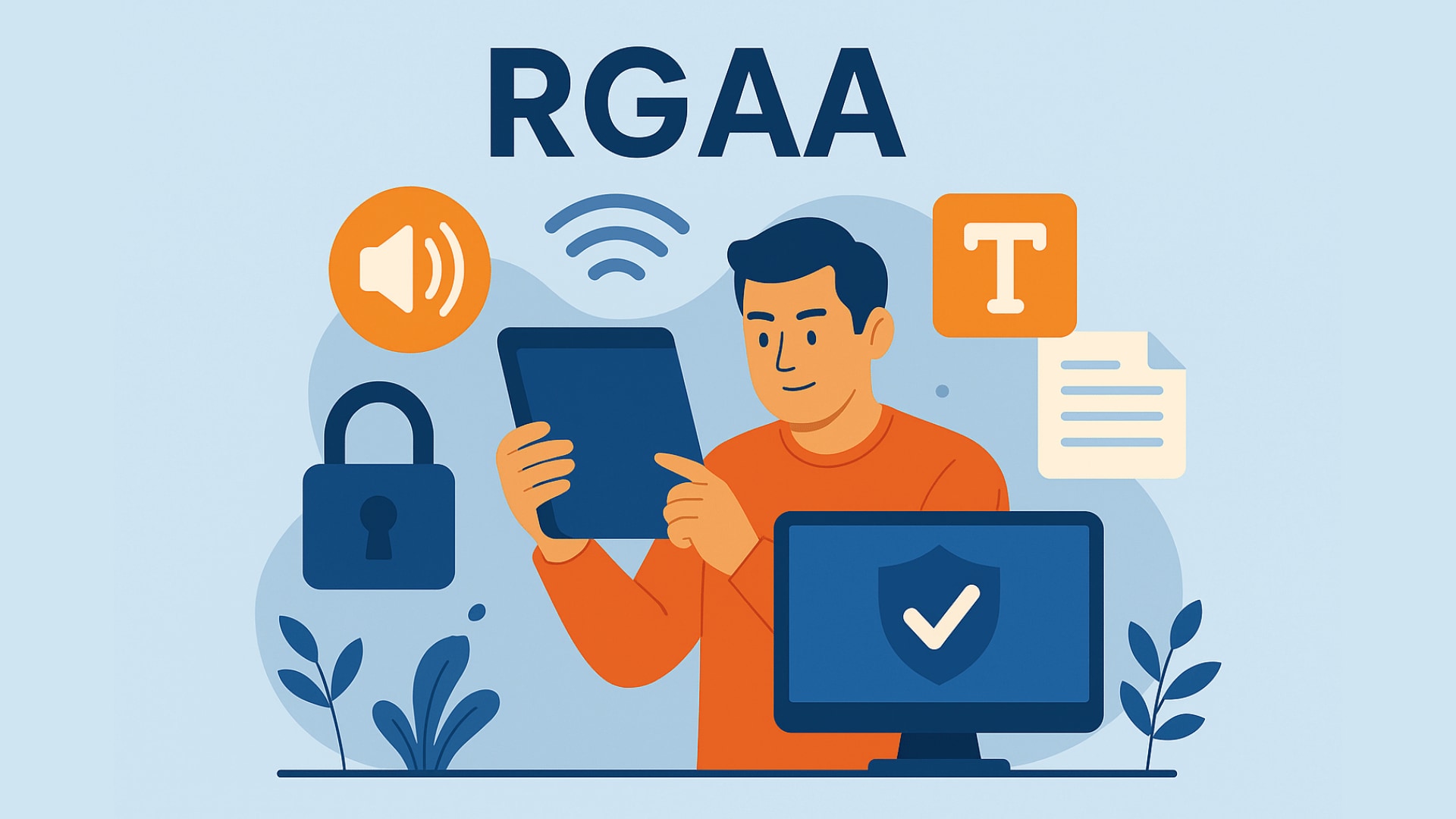
Accessibility means making digital resources usable by individuals with varying abilities, allowing equal access for all users. In France, the Référentiel Général d’Amélioration de l’Accessibilité (RGAA) has been implemented to ensure that digital offerings, such as websites and apps, are inclusive for people with disabilities. But what exactly does the RGAA entail, and why should businesses in France care about it? This article will explore the RGAA, its legal basis, and how businesses can ensure they meet these important accessibility standards.
Table of contents
Understanding the RGAA
The Référentiel Général d’Amélioration de l’Accessibilité (RGAA), introduced in 2009, is a framework designed to improve the accessibility of digital content in France. It is based on the Web Content Accessibility Guidelines (WCAG), created by the World Wide Web Consortium (W3C). The goal of the RGAA is to ensure that digital content, from websites to mobile apps, is usable by people with various disabilities, including visual, auditory, motor, and cognitive impairments.
For businesses, complying with the RGAA is not just about meeting legal requirements; it’s about ensuring that all users, regardless of their abilities, can access their products and services. By following the RGAA, companies contribute to a more inclusive digital environment, where everyone has equal access to online content and services.
Legal Foundation and Implications of RGAA Compliance
The RGAA is grounded in French Law No. 2005-102 (Article 47), which emphasizes equal opportunities and the inclusion of people with disabilities. This law, implemented alongside the European Accessibility Act (EAA), directs that businesses must remove barriers preventing people with disabilities from accessing digital resources. By making web services more accessible, the RGAA supports the goal of full societal inclusion, allowing individuals with disabilities to engage in digital activities on an equal footing.
While public sector organizations in France are required to comply with the RGAA, the framework also applies to private businesses with substantial revenues — specifically those with annual turnovers of €250 million or more. This makes RGAA compliance critical not only for public organizations but also for large private companies that engage with the public through their digital channels.
Why RGAA Compliance Matters for Businesses
RGAA compliance offers more than just legal adherence. It plays a vital role in increasing digital inclusivity, ensuring that people with disabilities can access online content and services. Businesses that prioritize accessibility demonstrate their commitment to equal access for all, which can significantly enhance their reputation and customer loyalty.
For organizations, the RGAA provides clear guidelines for ensuring that their digital offerings are accessible to everyone. This includes improving website navigation for those who rely on assistive technologies, providing alternative text for images, and ensuring that websites are compatible with screen readers and other tools. These changes enhance the user experience for all visitors, not just those with disabilities, which can help businesses reach a wider audience.
By committing to digital accessibility, companies also improve their SEO. Many RGAA requirements overlap with best practices for search engine optimization. For example, using properly structured content, alternative text for images, and accessible navigation can help improve search engine rankings, increasing visibility and driving more traffic to the site.
Key Principles of RGAA Compliance
The RGAA is based on four key principles that guide businesses toward creating accessible digital experiences:
- Perceivable: All content must be presented in ways that are perceivable to all users. For individuals with visual or auditory impairments, this includes providing text alternatives for images and ensuring there is sufficient contrast between text and background colors.
- Operable: User interfaces must be operable by all users, including those who rely on keyboards, screen readers, or other assistive technologies. Ensuring websites are navigable with a keyboard is a critical aspect of RGAA compliance.
- Understandable: Websites and content must be understandable to everyone. This involves using clear language, consistent layouts, and intuitive navigation to help users find and interact with content easily.
- Robust: Digital content must be compatible with a wide range of assistive technologies, devices, and web browsers. Ensuring compliance with web standards, such as HTML and ARIA (Accessible Rich Internet Applications), makes content accessible across various platforms.
These principles are designed to ensure that websites and digital services can be used effectively by people with a wide range of disabilities, from visual impairments to motor disabilities and cognitive challenges.
How Businesses Can Achieve RGAA Compliance
Achieving RGAA compliance requires a systematic approach to accessibility, focusing on areas such as content structure, design, and user interaction. Businesses need to implement the following measures:
- Accessibility Audits: Conducting regular audits of your website or app is crucial. This helps identify areas that may need improvement, such as navigational issues, inaccessible media, or missing alternative text for images.
- User Feedback Systems: Implement a feedback mechanism where users can report accessibility issues they encounter on your site. This helps ensure that any overlooked issues are addressed promptly.
- Use of Accessible Design Features: Businesses should implement design features that cater to users with disabilities. This may include using larger fonts, adding keyboard navigability, providing clear focus indicators, and offering assistive technologies like screen readers and voice control.
- Training and Awareness: Staff members involved in web development, design, and content creation should be trained in accessibility best practices to ensure that accessibility is built into every aspect of the digital offering.
How Captcha.eu Supports RGAA Compliance
As businesses focus on creating more accessible digital experiences, implementing an accessible CAPTCHA solution is essential. Captcha.eu offers a WCAG 2.2 AA compliant CAPTCHA solution designed to meet both accessibility and security needs. Our CAPTCHA system combines cryptographic and behavioral signals to ensure that only real users can interact with your website, all while maintaining a smooth, user-friendly experience.
Our solution is fully accessible, respecting user privacy and ensuring that it does not create barriers for individuals with disabilities. By incorporating Captcha.eu into your website, you can enhance your RGAA compliance, ensuring your site is secure and accessible for everyone, regardless of their abilities.
The Benefits of RGAA Compliance
Beyond legal requirements, RGAA compliance offers multiple business benefits. A key advantage is widening your audience. Accessible websites are usable by people with disabilities, older adults, and those using assistive technologies, such as screen readers. This inclusivity can lead to higher engagement, better customer retention, and increased satisfaction.
Moreover, an accessible website often leads to better SEO performance. Search engines favor websites that are well-structured and include accessible elements like alternative text for images, proper heading structures, and easy navigation. Therefore, RGAA-compliant websites are not only more inclusive but also more discoverable online.
Additionally, businesses that invest in accessibility demonstrate their commitment to social responsibility. This can significantly enhance a company’s brand image, showing customers that they value diversity and inclusivity. By prioritizing accessibility, businesses can build trust and loyalty with a broader audience.
Conclusion
The Référentiel Général d’Amélioration de l’Accessibilité (RGAA) is an essential framework for businesses in France to ensure that their digital offerings are accessible to everyone. Adhering to RGAA standards helps businesses improve their user experience, expand their audience, and avoid legal risks. Compliance is not just a legal obligation but an opportunity to demonstrate a commitment to inclusion and equality.
As businesses take steps to make their digital platforms more accessible, using solutions like Captcha.eu, which is WCAG 2.2 AA compliant, can help them meet both accessibility and security standards while respecting user privacy. By embracing RGAA compliance, companies not only meet legal requirements but also improve their digital presence, reach more users, and show their dedication to a more inclusive digital world.
FAQ – Frequently Asked Questions
What is the RGAA?
The Référentiel Général d’Amélioration de l’Accessibilité (RGAA) is a French standard designed to improve the accessibility of digital content, ensuring that websites, applications, and online services are usable by everyone, including individuals with disabilities. It is based on the WCAG (Web Content Accessibility Guidelines) and aims to make digital resources more inclusive.
Who must comply with the RGAA?
The RGAA applies to all public sector organizations in France, including government ministries, local authorities, and public bodies. Additionally, private businesses with an annual revenue exceeding €250 million are required to comply with the RGAA for their digital services and products. This includes websites, mobile apps, and any other digital platforms offering public services.
What does RGAA compliance involve?
Compliance with the RGAA involves following four key principles:
Perceivable: Making content available through multiple senses (e.g., providing text descriptions for images).
Operable: Ensuring websites and apps can be navigated using assistive technologies and keyboards.
Understandable: Using clear and simple language, and providing consistent navigation.
Robust: Ensuring content works with various devices and assistive technologies.
These principles ensure that websites and services are accessible to users with various disabilities, including visual, auditory, and motor impairments.
What are the penalties for non-compliance with the RGAA?
Failure to comply with RGAA can result in both legal and financial penalties. Public sector organizations may face fines of up to €50,000 per non-compliant digital service. Private companies with annual revenues over €250 million can face penalties of up to €20,000 per non-compliant service. These penalties can be repeated every six months if non-compliance persists.
How does Captcha.eu support RGAA compliance?
Captcha.eu provides a WCAG 2.2 AA compliant CAPTCHA solution that helps businesses meet RGAA requirements. Our cryptographic and behavioral verification system ensures that your website is secure, accessible, and user-friendly for all visitors, including those with disabilities. With Captcha.eu, businesses can enhance their RGAA compliance while respecting user privacy and offering a seamless user experience.
100 free requests
You have the opportunity to test and try our product with 100 free requests.
If you have any questions
Contact us
Our support team is available to assist you.




